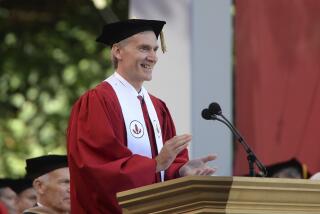Book Review : Scientist Obscured by His Achievements
- Share via
Thinking About Science: Max Delbruck and the Origins of Molecular Biology by Ernst Peter Fischer and Carol Lipson (W.W. Norton & Co.: $19.95; 271 pages)
Biography is among the most demanding of literary forms. To be successful, it calls for the skill of a novelist as well as a historian. Merely recounting the events of the subject’s life, no matter how accurately done, will not suffice. The bare facts must be woven together with insight that turns a two-dimensional catalogue into a three-dimensional life.
This is especially difficult with a scientific biography, particularly of a scientist like Max Delbruck, who lived a long and very productive life. If a scientist’s biographer concentrates too much on the scientific achievements, he risks slighting the human dimensions without which the story is incomplete. Unfortunately, “Thinking About Science,” the biography of Delbruck, makes that mistake.
Delbruck died in 1981 after a monumental career that began in physics but soon switched to microbiology, where he helped lay the groundwork for the discoveries about DNA and the genetic code that in the last 35 years have revolutionized the field and propelled biology to the forefront of science. For his efforts, he won the Nobel prize in 1969.
Like many scientists, Delbruck was also an extraordinary human being, full of insight and wisdom far beyond his obvious scientific skills.
Ernst Peter Fischer, who was a graduate student of Delbruck’s at Caltech, and Carol Lipson, an English teacher at Syracuse University, have described Delbruck’s work in detail--excruciating detail. To be sure, they do not leave out Delbruck the man, but he almost disappears in the welter of descriptions of his biological experiments and contributions.
Perhaps that is too harsh. After all, the discovery of the structure of DNA by Watson and Crick ranks as one of the most important achievements in the history of science, and it would be hard to overestimate Delbruck’s seminal contributions along the way. It was Delbruck who turned biology to the study of molecules rather than whole organisms, a commonplace notion today that was revolutionary 50 years ago.
Balance Is Lacking
Nor is it accurate to say that “Thinking About Science” is only about Delbruck’s science and not about the kind of person and thinker he was. It’s just that the balance seems somehow wrong. Reading the book I craved to know more about Delbruck, and I would have sacrificed some of the biology to get it.
A year after Delbruck died, the American Scholar published a 16-page “appreciation” of him by Solomon W. Golomb of USC, who had been a friend of Delbruck’s for 25 years. After reading Fischer and Lipson’s book, I went back and reread Golomb’s short personal sketch, which all but ignored Delbruck’s science.
Perhaps the two pieces need to be read together, or Golomb’s appreciation should be printed as the introduction to Fischer and Lipson’s book. It does a better job at capturing the subject.
More to Read
Sign up for our Book Club newsletter
Get the latest news, events and more from the Los Angeles Times Book Club, and help us get L.A. reading and talking.
You may occasionally receive promotional content from the Los Angeles Times.










